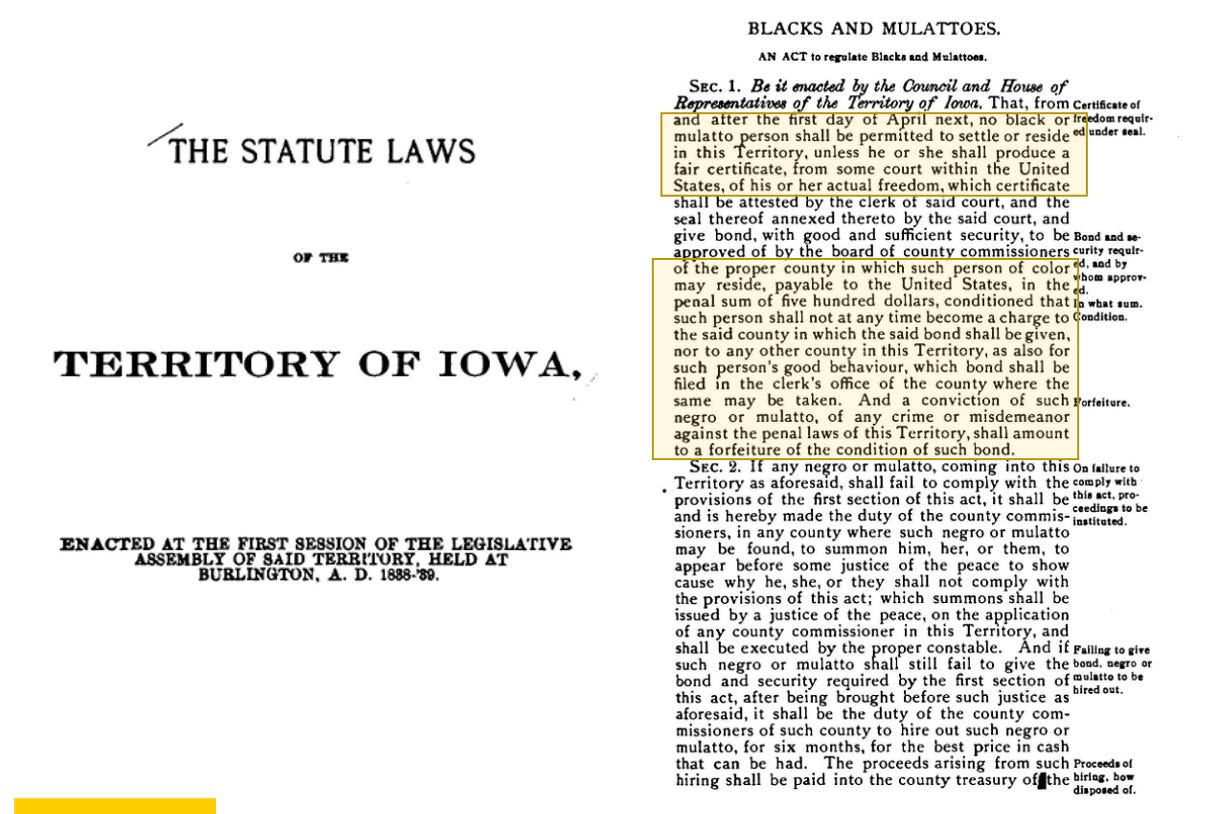If you haven’t seen Bob Leonard’s piece on black farmers struggling to overcome racism endemic to American agriculture and USDA programs, please take a look. His column appeared both on his substack and in the Capital Dispatch.
Bob’s essay retrieved from my memory some work of Silvia Secchi at the University of Iowa concerning the historical context of race and the Iowa farmer, and much of what follows is a result of her work.
An incredible 99.6% of Iowa farmers are white. In a country as diverse as the United States, you don’t get 99.6% of anything unless it is by design. Even the National Hockey League, the top professional level of a sport conceived by white people during the dark, cold nights upon the frozen prairies of 1800s Canada, has a far higher percentage of people of color (10%) than Iowa farming. Which perhaps weirdly makes me wonder what an Iowa farmer would look like with a mullet haircut (that favored by hockey players everywhere) under a DeKalb seed corn cap.
Iowa as a whole is about 89% white, while the U.S. is 58% white.
I’ve heard people in Iowa agriculture explain away the ‘all white’ thing by saying, well, farming is a generational business (true) and since almost all the early settlers were white (also true), it follows that subsequent generations would also be white. Ok, but why were the early Iowa settlers all white, when 17% of the U.S. was non-white about the time Native American people were being displaced by settlers?
As the title says, it was by design.
Early Iowa territorial and state law restricted entry into the new state to white people by requiring black and mixed-race people to pay a bond of $500 (about $18,000 today) to the commissioners of the county where they intended to reside. This of course was not a requirement for the newly arriving white people, which included my great-great grandfather Johann Peter Wagner, newly arrived from Germany and who staked his claim and farmed in Des Moines County near Burlington.
Have you ever wondered why that little triangle of land in Southeast Iowa, bordered by the Des Moines River on the west and the Mississippi River on the east, belongs to Iowa and not Missouri? That section of Iowa was originally known as the ‘half-breed tract’ where mixed race people (usually Native American/White) were allowed to settle and farm, but only for a time. Early whites decided they wanted that ground too and usurped it from the first mixed race farmers.
Whether any of us can be blamed for the acts of our ancestors is a question that has haunted many if not most cultures since the dawn of civilization. My feeling on this is no, but our actions in the present day deserve great consideration if we expect, or deserve, absolution. Whether you think Iowa land was stolen, conquered, or acquired fairly, the historical and scientific facts glaringly show we have treated the creation here with far less reverence than those that came before us. We could have preserved much of the state in its natural condition—we didn’t, for reasons that link back to the economic and cultural forces of the time and that prevent restoration in the present day. It certainly was not and is not because people were/are hungry. We suffer the consequences of this with polluted drinking water and degraded streams, lakes and other natural resources.
The early white folks that entered Iowa following the Blackhawk War sought to drive out indigenous people with the full knowledge a degraded life awaited the displaced. We conquered them, and by god, they had to find somewhere else to live. Or die. The early white folks also (successfully) sought to exclude non-white people from exploiting this new-found Eden of biological productivity. How do we judge this in the present day, when this productivity has been deliberately and knowingly assigned to the work ethic of the (white) farmer and the genius of scientists and engineers that may have magnified the productivity, but also befouled nature’s design? Farmers, agribusiness, Iowa’s universities and government agencies, i.e., ‘the people’, make decisions every day with the full knowledge that those decisions will harm their neighbors. The full knowledge.
It is within this context that we deserve to be judged for our historical treatment and exclusion of people of color from Iowa, and from Iowa agriculture. Can we find it mysterious that young people don’t want to live here? I think not.
Resources
https://www.kcci.com/article/college-graduates-leaving-iowa/46961839







Thanks for saying this: "Whether any of us can be blamed for the acts of our ancestors is a question that has haunted many if not most cultures since the dawn of civilization. My feeling on this is no, but our actions in the present day deserve great consideration if we expect, or deserve, absolution."
There's a lot of anti-DEI rhetoric out there, which is the reactionary response to CRT and the general social and legislative trends towards equality starting all the way back with the Civil Rights Act. Our country needs to hear more White people affirming that one does not need to internalize *blame* for the actions of their ancestors in order to acknowledge the damage and harm done by them, and try to help mitigate that damage now and into the future.
Being born and raised white to parents of sharecroppers working a small dairy farm in Blackhawk county Iowa, I feel the double edge sword of knowing the love of farming and the bewildering cost of absolution.
My paternal Grandfather lost his farm in the depression leaving my father coming home from WW2 knowing little more than farming to provide for a growing family of three boys and a girl.
Three boys was advantageous in the dairy business as we were left to milk the cows by ourselves at very early ages while Dad found various employment opportunities away from the “ cash cows”.
I had a good life being raised on the farm and was going to be a “good” farmer until the mid seventies when the combination of a shady landlord’s financial advisor and the start of the farm crisis ended my dreams. Lucky me!
Having known of one black family that had bottom land along the Wapsipinicon river in neighboring Buchanan county, I always wondered if I had any different feelings about agribusiness in Iowa than they did. I occasionally saw them visit the land but never had an opportunity to talk to them.
My experience is whites can be as ruthless to other whites as they can be to any other color of skin. Thank you Dr. Leonard and Dr. Jones.